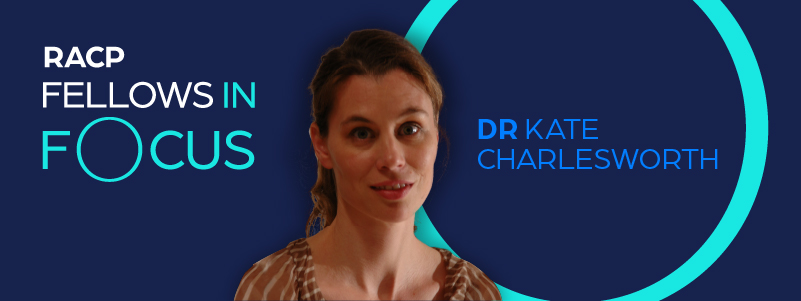RACP Fellows in Focus: Dr Kate Charlesworth
Date published:
17 May 2021

From the outset, Dr Kate Charlesworth has always been interested in bigger picture issues and has been diligently working away for years to shine a light on such issues that face us all, “before it’s too late”.
Kate is a public health physician in Sydney, and after working as a hospital doctor in Sydney and Perth, Kate completed much of her training in public health medicine in the United Kingdom. She was a research fellow at the London School of Hygiene and Tropical Medicine and then at the Sustainable Development Unit in Cambridge, a world-leading unit tasked with reducing the carbon footprint of England’s National Health Service. Kate now works in the New South Wales’ public health system as a medical specialist in environmentally sustainable healthcare. Remarkably, the first such role in Australia.
Kate has also completed a PhD in low-carbon healthcare and has 15 peer-reviewed papers. When reflecting on how she transitioned into the environmental space she said, “One afternoon I went to a lecture on climate change and health and it just set out very clearly what we're on track for in terms of climate change, what the health impacts would be and what the evidence for it was. It was delivered objectively and in a very evidence-based way. I remember sitting there thinking that if we don't address climate change, it will jeopardise everything else. It’s such an urgent and important issue.”
Kate continued, “I was in the United Kingdom for four years, as I did a lot of my advanced training there. To come back and see how far behind climate and health policies are in Australia, was really disappointing.”
“I think a lot of people think that climate change might be important, but few people realise how urgent and serious it is. For health professionals, our core business is health, and climate change is a health issue. We have a responsibility to speak up.”
On the range of skills that as a public health physician she brings to her job Kate said, “I think one of the most useful things about public health physicians is the range of skills that we bring to it. We have both clinical experience and also a range of skills from our advanced training in public health medicine. I also have a PhD, so I've got academic and research experience as well. This role is bringing all of that together.”
“I'm a really important interface between our senior clinicians and the research community, and also look at the day-to-day issues like energy and recycling. I think one of the strengths of public health physicians is that diversity of experience.”
The challenges of a role, like the one Kate finds herself in, is not without an unrelenting torrent of challenges. Kate shared, “How do you convey to people the seriousness of climate change and its relevance to their health, to their children's asthma, to what's happening in their community and use that to help drive an appropriate response?”
Kate also mentioned how important her role within the RACP has been in delivering her message and how the relationship is mutually beneficial,
“In the last few years, recognising that climate change is a core health issue, the RACP and others really started to step up and take a strong evidence-based stance on it. I've been involved in helping out in the position statements that we've written and also in the position on the Black Summer bushfire smoke. The RACP and a number of other colleges came out very strongly and announced climate change as a public health emergency. I think that having the weight of the RACP behind those statements is really important.”
When it comes to a legacy, for the highly accomplished Kate, she noted, “we need to see a carbon neutral and a climate-resilient health system. That would be a system in which we had much more of a focus on prevention and community-based care. We’d obviously have 100 per cent renewable energy, we’d have solar panels on hospital roofs, better designed hospitals and we'd be seriously looking at waste and plastic pollution. We’d think about different ways to optimise pharmaceuticals and new technologies and have a really strong focus on high-value care. We’d also be prepared for what's coming in terms of extreme weather.
“If we're going to have a health system that's fit for the future, then we need to be seriously planning for those things. Leading medical voices, including the AMA, are calling for the Australian health system to be net-zero by 2040 and a national plan for resilience against the kind of impacts that are coming. So, that's what I'd like to see in the next 10 or 20 years because otherwise, it will be too late.”
Watch Dr Kate Charlesworth reflect on her career journey